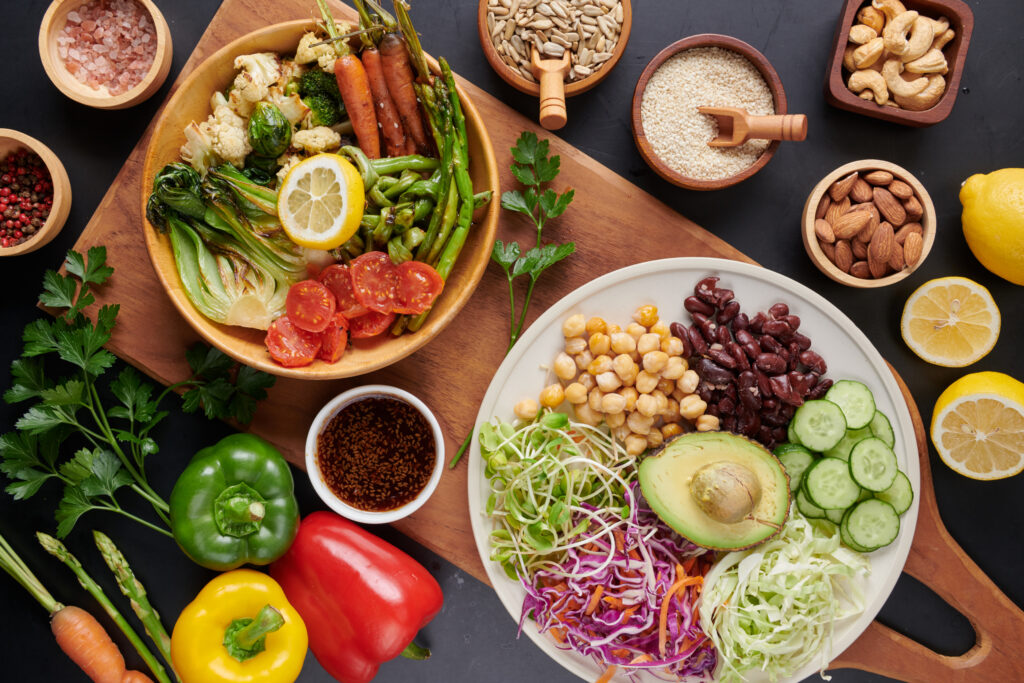
We make dietary recommendations for women to reduce risk of heart disease, support strong bones, encourage muscle mass, and improve overall health. These dietary approaches are impactful because of the micronutrients they provide. Let’s focus on the vitamins and minerals that benefit women’s health. They can be especially important at specific stages of life or with the use of common medications.
Iron
About 1 in 10 women aged 12– 49 years have an iron deficiency. It is the most prevalent deficiency among females (especially when menstruating or pregnant). While supplementation may still be necessary, Guiding Stars earning iron-rich foods can help. Go for very lean red meat, shellfish, beans, lentils, dark leafy greens, dried fruit, nuts, seeds, and fortified grains. (Note: Plant-based iron sources do not absorb as easily.)
B Vitamins
Vitamin B needs change throughout our life span, and diet, medication use, and health status all impact our needs. For example, medications that influence estrogen levels can interfere with vitamin B metabolism, thereby increasing daily needs. And during pregnancy it’s essential that vitamin B levels remain adequate to reduce the risk of neural tube defects. You’ll find vitamin B primarily in dairy foods. It’s particularly important for vegan individuals to pay close attention to vitamin B12 status and add a supplement if needed.
Folate
Another B vitamin (folate) plays an important role in birth defect prevention and lowering risk of heart disease. Green leafy vegetables, asparagus, avocados, and Brussels sprouts are all good sources of folate. Some foods (like cereal and bread) are fortified with folic acid, a synthetic form of folate, to help us improve our intake of this essential vitamin. You’ll also find folic acid supplements on store shelves. If you’re planning to become pregnant or are pregnant, folic acid supplementation is strongly encouraged.
Magnesium
Magnesium is essential for women’s health. First, magnesium supplementation can help manage both premenstrual and menopausal symptoms. Due to its helpful role in glucose metabolism, magnesium is also beneficial for women living with PCOS. Lastly, magnesium plays a role in maintaining bone density, making it important for preventing bone loss (especially among postmenopausal women). Certain medications, however (like those used to manage acid reflux or GERD), can negatively impact magnesium absorption and status.
Zinc
Zinc plays a critical role in fertility and reproductive health. It is impactful on the menstrual cycle and may align with PCOS onset. Zinc also helps support a strong immune system, encourages wound healing, and has other positive impacts. Health factors and diet may impact zinc absorption. We find zinc primarily in meat and dairy foods, which puts vegans and vegetarians at greater risk of zinc deficiency. Nuts, seeds, legumes, and whole grains are also good sources of zinc. However, it’s important to note that the bioavailability of zinc from plant sources is limited.
Vitamin D
Vitamin D plays a significant role in maintaining muscle mass, bone density, and overall strength and balance in post-menopausal women. Research also shows that vitamin D plays a role in reducing hot flashes. Declining estrogen levels influence the body’s ability to synthesize vitamin D, which makes the need for supplementation even greater.
Calcium
The need for calcium goes beyond just bone health. Calcium plays a role in nerve transmission, muscle contraction, and reducing risk of chronic disease. Consuming calcium intake through food is best for absorption, but supplementation may be helpful. If calcium intake is inadequate, perimenopausal and menopausal women are at greater risk for developing osteoporosis. Declining estrogen levels contribute to this risk by reducing calcium absorption. For this reason, women over the age of 50 should aim for 1200mg of calcium/day (1000mg/day for younger women).